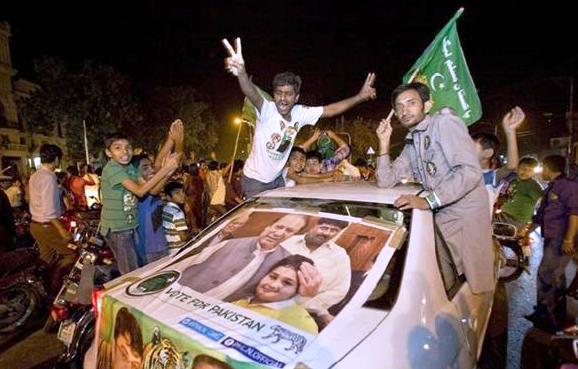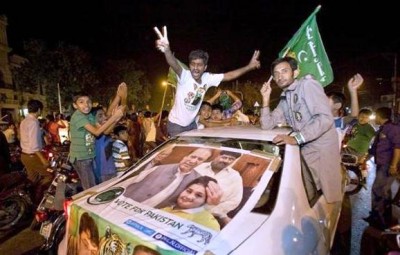Ashish Shukla for BeyondHeadlines
Pakistan is known to outside world as the “land of ironies” where it is quite difficult to witness back to back cheerful moments. However, one cannot completely rule out the possibility either. After the successful completion of a full five year term, for the first time in the history, by the National Assembly of Pakistan, the country witnessed another milestone on 11 May 2013 in the form of 10th general elections. What makes this event even more important is the fact that the elections were held under a civilian caretaker set up led by Justice (retd.) Mir Hazar Khan Khoso. This is nothing less than a watershed or a rarest in the rare event in the history of Pakistan. For a country which has been under military boots, almost half of the time since its inception, general elections can be considered a great relief and a significant achievement in itself. The happiness grows manifold because of the fact that people came out, amid repeated warnings and direct life threats from the dreaded terrorist outfits like Tehrik-e-Taliban Pakistan (TTP), and voted in large numbers. According to the Election Commission of Pakistan (ECP) around 60 percent of the total 86 million registered voters exercised their voting rights and decided the fate of 4,671 candidates who were in the fray for 272 National Assembly seats. There may be some irregularities and rigging at some place, as claimed by Imran Khan, but one should not worry about these petty things as it will disappear with the passes of time.
Predicting anything about Pakistan has always been difficult. Election results are no exception. Political pundits were very much sure that Pakistan Peoples Party would be voted out and Pakistan Muslim League-Nawaz (PML-N) would manage to be the single largest party after the elections but none had hoped that PPP would almost be decimated. Many of these pundits had claimed, on the basis of the traditional wisdom, that there would be no significant change in the voting pattern (dominated by clan and biradari connections) and the main contest would take place between PML-N and PPP. Going by this logic, it was expected that Nawaz Sharif’s PML-N would get around 90 to 100 seats followed by PPP with around 60 to 70 seats. Apart from it, there was a lot of discussion in media about the youth bulge (around 25 million registered voters) going with cricketer turned politician Imran Khan and making Pakistan Tehrik-e-Insaf (PTI) a significant player in Pakistani politics. However, there were people like Prof. Waseem Mohammad of Lahore University of Management Sciences (LUMS) who had serious reservations over the issue. Prof. Waseem had rightly pointed out that only urban youth were attracted to Imran Khan and made their presence visible through the modern means of communications but there was no sign of rural youths going the same way, as the voting is also “territory-bound and constituency bound.”
In the end, it is the people of Pakistan who emerged victorious and gave a strong message to anti-democratic forces of the country. It is a mandate for democracy, stability, peace and hope for development. Pakistanis preferred Tazurba (experience) over Tabdeeli (change) and gave Nawaz Sharif a clear edge over Imran Khan. As per the latest reports, PML-N had won 125 seats followed by the ruling PPP which bagged 32 seats, while the PTI got an impressive 31 seats and MQM managed to win 17 seats.
There is a need to carefully analyse the election results. The very first things which comes to mind is an unfortunate reality and the fact that the playground was not level at all as far as all the political parties and stakeholders are concerned. Terrorist organisations had a one point agenda of targeting secular parties and discourage their candidates from canvassing, campaigning and addressing election rallies. TTP spokesperson Ehsanullah Ehsan, on various occasions, justified attacking secular parties and claimed that these parties were primarily responsible for the “displacement of millions of people, the plight of the Pakhtun, for abandoned villages and destroyed mosques”. Pakistan Peoples Party (PPP), Muttahida Quami Movement (MQM), and Awami National Party (ANP) suffered a lot because of the targeted attacks by TTP. As per the media reports, TTP successfully organised more than 40 attacks, since 1 April 2013, which resulted in the death of 140 people and left over 500 injured. Asad Munir, Brigadier (retd.) of Pakistan Army, reported to have said that “the most effective campaign is being run by the Taliban” and “they are holding the state of Pakistan hostage, and doing their activities as they want.” This explains the ground situation in Pakistan.
One can realise the gravity of threat posed by TTP with the fact that Asfandyar Wali Khan, Chief of ANP, couldn’t campaign in the election freely and was forced to confine himself in a house in Islamabad—far away from his base in Khyber Pakhtunkhwa (KP). He bitterly complained by saying “where is the level playing field when three parties are on the hit-list and four parties have been given a free hand.” He even mocked ECP by referring Hakimullah Mehsud, TTP Chief, as the referee of the electoral exercise. More or less the same story has been with MQM and PPP. Both of these parties fought the election without their leaders. PPP went into elections without its main leader. Bilawal Bhutto, Chairman of PPP, couldn’t lead the campaign because of the threat posed by the Taliban. He even did not cast his vote in the election. Kidnapping of Ali Haider, a PPP candidate and former Prime Minister Yousuf Raza Gilani’s son, justifies Bilawal’s absence from the scene.
Given the violent situation on the ground, it is hard to believe that the elections were technically free and fair. All other political parties, except secular and targeted ones, did not criticise Taliban openly. Be it Nawaz Sharif or Imran Khan. PML-N got the benefit of not speaking publicly against the rightwing and extremist forces. There are enough evidences to suggest that Nawaz Sharif’s party has had a tacit understanding with the Ahle Sunnat Wal Jamaat (ASWJ), a Sunni sectarian outfit, and Lashkar-e-Jhangvi (LeJ), a militant organisation also known as Punjabi Taliban. These connections have somewhat helped PML-N consolidate its position in the elections.
Although Nawaz Sharif is set to be the Prime Minister of Pakistan but it is not going to be an easy task for him. Civil-military relations is one area where Nawaz will have to be patient. Recently, in an interview with the Karan Thapar of CNN IBN, he gave the impression that if he comes to power, he will be the boss of the army. There is little doubt that the credibility of Pakistan Army has been declined in recent years, especially after the US secret operation in Abbottabad, but it is still very much holding the key areas tightly and have the capacity to strike back in case of its institutional interests are threatened. One should not forget the fact that PPP government survived because it did not challenge the interests of the Pakistan Army. One should also remember that army had ousted Nawaz Sharif from power, even at a time when he had a strong two thirds majority in the National Assembly. This time he is not having that kind of majority. Apart from it, now Imran Khan, also known as Taliban Khan, will most likely sit in opposition and probably do the betting of the army.
In the end, it is important to point out that Nawaz Sharif’s menu is too crowed to be fulfilled. Although, he has promised the people of Pakistan to fulfill each of his promise but only time will tell to what extent he will be able to honour his own words. The first priority, undoubtedly, is going to be the restructuring of Pakistan’s economy followed by law and order problem, smooth relations with military establishment, terrorism, and relations with India, Afghanistan and the United States.
(Author is Ph.D. Candidate, South Asian Studies, School of International Studies in JNU, New Delhi.)























